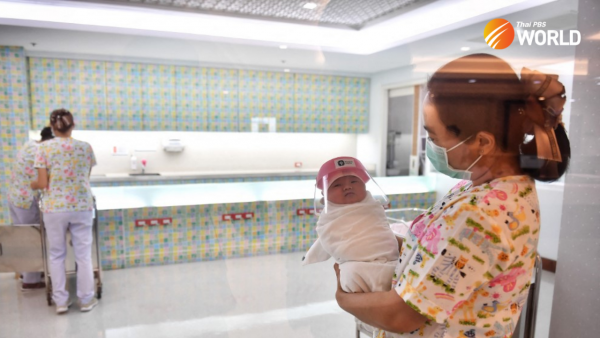Can Thailand detonate the baby boom it needs as retirement time bomb looms?

Thai retirees started outnumbering people entering the workforce for the first time last year, sparking concerns that the country faces a future of economic and social breakdown.
An official report titled “Thailand’s Critical Birthrate Fall” estimates that the number of first-jobbers (people aged between 20 and 24) has already dropped below the number of people hitting retirement age (60 to 64 years old) in 2023.
“The gap between these figures threatens to cause labor shortages, raise the dependency ratio, and increase elderly healthcare expenses,” the report said.
Motivating people to have babies
If the trend of falling birthrate is not reversed, Thailand’s population will shrink from its current level of 66 million to just 33 million by 2083, says demographics expert Prof Kua Wongboonsin.
Projections also suggest that over the same period, the number of working-age people in the country will collapse from 46 million now to just 14 million. The number of retirement-aged Thais (over 65), meanwhile, is projected to jump from 8 million now to 18 million.
“If this demographic shift happens, the government won’t have enough tax revenue to fund national development,” Kua warned.
Recognizing the problem, the government is looking for ways to encourage people to have more babies.
Later this month, the Cabinet will consider a draft plan on reproduction to increase the number of annual childbirths in Thailand.
More than a million babies per year were born in Thailand between 1963 and 1983. However, that figure had plummeted to just 485,085 in 2021.
The draft plan seeks changes to laws and regulations that will make it easier for couples to decide to have kids.
The changes will encourage family-friendly workplaces, increase the number of childcare centers, and also subsidize the cost of childcare for toddlers. Additionally, they will promote family values and provide quality services for people who want to have children. For instance, couples with fertility problems will be given easier access to medical services such as invitro fertilization, making it more likely that they will have kids.
Public Health Minister Dr Cholnan Srikaew, who chairs the national reproductive health development committee, said that state-run childcare centers would in the future reduce the age at which infants can be enrolled – from the current 18 months to six months old.
“We will also consider extending maternity period from the current three months,” he said.
Prime Minister Srettha Thavisin said that while his government respects women’s right to decide whether to have kids, it is determined to provide a proper environment in which that decision can be made.
“Working women will be able to enjoy work-life balance,” guaranteed the PM, who also serves as the finance minister.
“The quality of education in the country will be good so that they won’t have to worry about where to enroll their children,” he promised.
Dr Somchai Jitsuchon, research director at the Thailand Development Research Institute (TDRI), said other countries had launched successful measures to extend maternity leave to six months while also ensuring that mothers could return to their old jobs after this period.
“Some countries grant paternity leave in place of maternity leave, which is useful when a male parent’s salary is lower than that of the female parent,” he said.
Why are more Thais deciding not to have kids?
An increasing number of middle-class couples are opting for child-free lives because they are concerned about the quality of life their children would experience, Somchai said.
“They know that rich kids can go to top international schools, which charge about 1 million baht per year, and graduate with remarkable capabilities. When they consider their own situations, they know they can’t pay such hefty tuition fees.”
But if the government can improve the quality of schools in general, more couples will be ready to have kids, he added.
Currently, between 60% and 70% of Thai families are not in a position to offer a high-quality upbringing to their children, Somchai said.
Growing elderly population
Civil society organizations are demanding that the government pay attention not just to the falling birthrate but also to the expanding elderly population. However, the Pheu Thai Party, which leads the coalition government, apparently has no plans to increase monthly subsidies and welfare for senior citizens.
Nitirat Subsomboon, a representative of the We Fair Network, said the Pheu Thai-led administration should guarantee a basic income for every elderly Thai – not just specific groups or those who have low income. The monthly subsidies should ensure that senior citizens do not fall below the poverty line, he added.
“Only when this happens will elderly Thais be guaranteed a good quality of life,” he said.
The government should also stop saying that such subsidies were a fiscal burden on the nation since in reality, retired civil servants received far more from state coffers, Nitirat commented.
“On average, the government provides just a little over 600 baht per month to each elderly Thai. But the average budget for retirees is about 30,000 a month per head.”
Theepakorn Jithitikulchai, of Thammasat University’s Center for Research on Inequality and Social Policy, said that if the government raised value-added tax (VAT) by just 1% from the current 7%, it would have at least an extra 100 billion baht to spend on retirees.
“For a long time now, the World Bank has been urging us to raise the VAT rate to 10%. We need to make the move.”
In reality, said Theepakorn, Thailand currently has the means to finance a universal pension of up to 3,000 baht a month if the government was determined to do so.
He said the government should not be concerned only about limiting budget expenses; it needs to understand that to boost the quality of life for Thais, more money must be spent.
“If we don’t head in the right direction, Thai society will grow desperate.”
Theepakorn said the poor would shoulder the brunt of worsening conditions in Thai society, because they lack the ability to adjust in times of crisis and have little financial protection in the form of welfare.
By Thai PBS World’s General Desk






